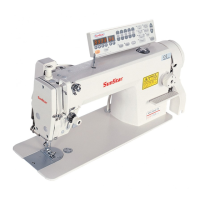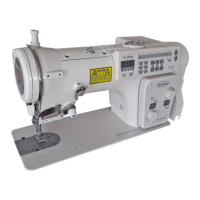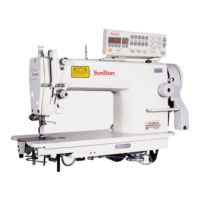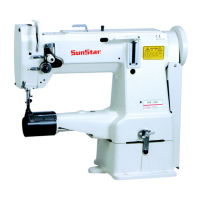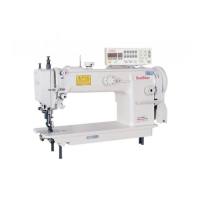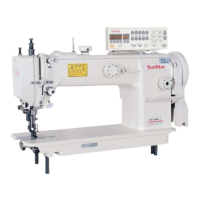27
88
Maintenance and repair
[ Caution ]
·For machine maintenance and repair, consult with qualified technicians.
·For electrical maintenance and repair, consult with qualified technicians or agencies.
·When safety devices are disassembled, make sure to return them to original positions.
·Use both hands when bending the machine backwards or returning it to the original position. Using only one hand can lead
to severe hand injuries due to the weight of the machine.
·Turn off the switch and pull the plug. Pressing pedal by mistake may result in physical injuries.
·Inspection, maintenance, repair
·Exchanging expendable parts such as needle, hook, knife.
·Adjusting hook oil flow
·In case you operate the machine when the power is on, please take special precaution.
8-1. Adjusting thread take-up spring
8-1-1. Position of thread take-up spring
It is standard that thread take-up spring① is at the place where
the spring’s movement range is 6~8mm from the upper surface
of thread routing plate③ with presser foot② descending. (
A
and
G type)
(For
B and
H type, 4~6mm is standard)
1. Lower presser foot②.
2. Loosen fixing screw④ lightly.
3. Adjusting position by turning thread control device⑤.
4. Fasten fixing screw④ tightly.
8-2. Adjusting right arm thread guide
1. It is standard that clamp screw② is placed at the center of
long hole of right arm thread guide①.
2. Loosen clamp screw② and move right arm thread guide①
both sides to adjust.
3. In case of heavy material sewing, move right arm thread
guide① to the left. (The amount of thread in thread take-up
will increase.)
4. In case of light material sewing, right arm thread guide① to
the right. (The amount of thread in thread take-up will
decrease.)
[ Figure 40 ]
[ Figure 41 ]
②
①
③
⑤
④
6~8mm
For light
material
For heavy
material
②
①
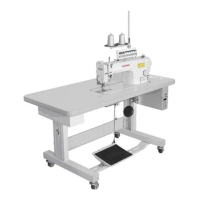
